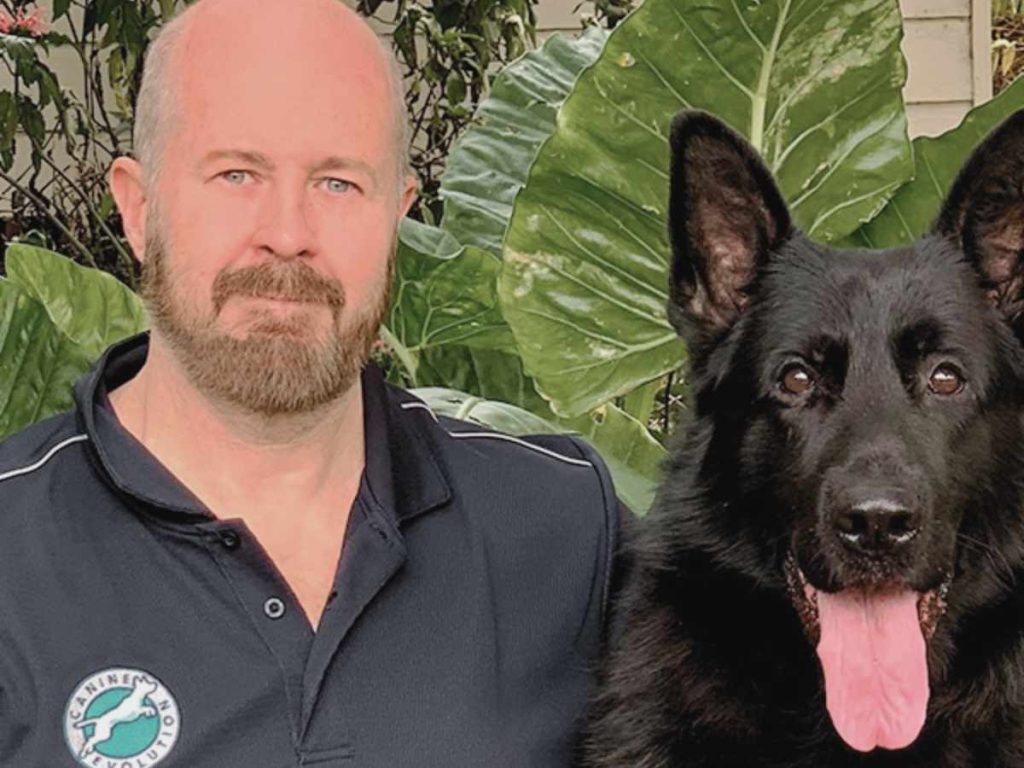Written by Glenn Cooke, Chief Training Officer at Canine Evolution and Pet Resorts Australia


Estimated reading time: 5 minutes
Glenn Cooke shares his expert dog training tips with Animal Friendly Life readers.
With more than three decades of experience providing exceptional training to dogs and their handlers and his trailblazing approach, Glenn is a leader in the pet and training industry.
Placing a strong emphasis on the handler, Glenn demonstrates that optimal results are achieved through empowering the human component of the handler-dog relationship.
He offers readers his expert insights and tips for building a strong bond between handlers and their canine companions.
Essential dog training tips – the benefits of early intervention and socialisation
“It means a holistic exposure to diverse experiences, unfamiliar faces, varied animals, and multiple environments.“
Glenn Cooke
The early days of a dog’s life play an enormous role in determining their lifelong behaviours.
In our modern society where dogs are increasingly regarded as family members, we want them to fit seamlessly into our everyday lives.
We want our dogs to be comfortable, sociable, and adaptable in every situation.
Whether it’s a quiet evening at home, a bustling community event, or a casual stroll through a park.
But for this vision to happen, early intervention and comprehensive socialisation cannot just be optional dog training tips– they are absolute necessities.
These tools help pave the way for our dogs to lead fulfilling lives, while enhancing ours also.
I want all pet owners to know that investing time, patience, and effort into dog training early on will set up for many wonderful memories in the years ahead.


Early intervention
Imagine a young puppy witnessing the dazzling and booming fireworks for the very first time.
The sudden cacophony of sounds paired with the bright and unpredictable flashes can be profoundly unsettling to their unaccustomed senses.
Without a proper and timely response to this initial discomfort, the dog may etch these stimuli as triggers for fear.
This could potentially cause events like New Year’s Eve or party nights to become traumatic rather than joyous.
This is a prime example of why early intervention isn’t just preferable, it’s vital.
Early intervention aims to ensure that transient fears are caught and dealt with early, before they become permanent phobias.
Socialisation and habituation


When we talk about early and meticulous socialisation, it goes beyond familiarising dogs with a few friends and family.
It means a holistic exposure to diverse experiences, unfamiliar faces, varied animals, and multiple environments.
Habituation, on the other hand, is the process where our dogs get accustomed to the daily ebb and flow of life.
This includes adjusting to new surroundings, machinery, appliances, and more.
It doesn’t just prepare a dog for household life but also readies them for the vast, unpredictable world outside.
In the absence of this rigorous initiation, dogs might manifest behavioural anomalies – from undue aggression to excessive shyness.
And remember, a well-socialised dog doesn’t just benefit its immediate family, but the entire community.
Tips for addressing behavioural challenges – Glenn’s four-pronged approach
Start training early: Obedience and socialisation classes are not just for the dog; they’re equally educational for the owner. Such programs should be a rite of passage for every puppy-parent duo.
Recognise their needs: A dog isn’t just content with food and shelter. Ensure they receive a balance of physical activities and cognitive challenges. This not only keeps them engaged but also wards off potential behavioural pitfalls.
Consistency matters: Dogs thrive on predictability. All family members should align their training approach, ensuring that commands, rewards, and discipline is consistent.
Seek expert guidance: For persistent behavioural concerns, don’t hesitate to consult a seasoned canine professional. Remember, popular influencers might not always have the practical expertise you need.


How to know if nuisance behaviours are symptoms of a deeper issue
One must always strive to discern the reasons behind disruptive canine behaviours.
Often, these behaviours are manifestations of underlying issues like boredom, anxiety, or a vacuum of structured training and guidance.
Consider a dog incessantly barking when left on their own – it could be a stark manifestation of separation anxiety.
Similarly, a dog engaging in relentless digging might be signaling a desperate need for intellectual or physical challenges.
It’s pivotal to understand that these behaviours aren’t about defiance or a naturally ‘bad dog’.
They are, in many cases, silent pleas for understanding, attention, and timely intervention.
Responding solely to the overt behaviour, without delving into its root, might just be a patchwork solution, leading to more problems down the road.
